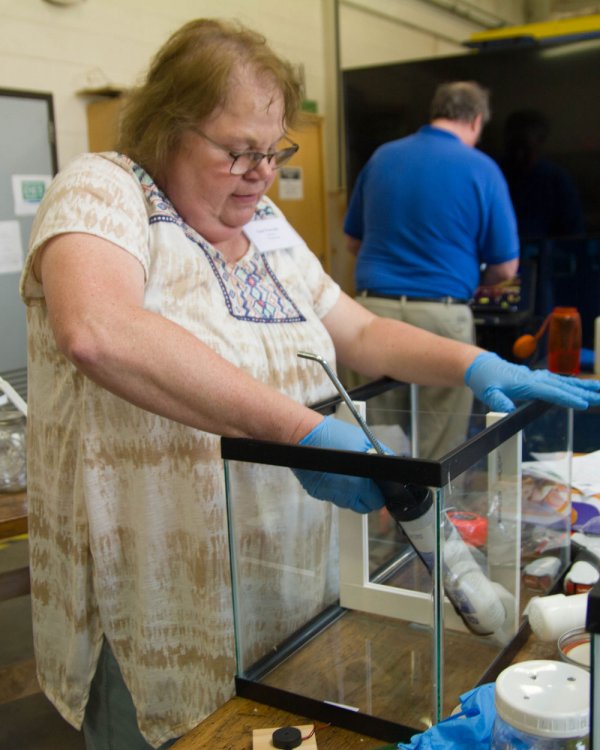Source: South Dakota State University
Ideas for new curriculum units and the chance to network with university professors and other teachers drew 24 South Dakota science and agriculture teachers to campus for the iLEARN professional development workshop, May 24-26. This is the second year for the workshop.
Associate biology professor Madhav Nepal leads the group of SDSU researchers working with the teachers as part of a U.S. Department of Agriculture Professional Development Opportunities for Secondary School Teachers Program. The program is designed to encourage more students to pursue careers in agriculture through effective teaching by a well-trained taskforce, explained Nepal. “This gives us another opportunity to enhance agriculture through science, technology, engineering and mathematics education, as well as advocate for agri-science curriculum in South Dakota.”
Lisa Bahe, a science teacher from Mitchell who will be teaching at Brookings High School this fall, learned about the workshop at the South Dakota Science Teachers Association annual meeting. While some workshops are very content-specific, Bahe said, “Here we get ideas that cover a vast array of knowledge.”
The participants built a photo-bioreactor and made an aquarium to demonstrate ocean currents. They also learned about precision agriculture, indigenous plants, food science, recycling, climate change, sustainability and pollinators, as well as landscaping and soil science. The lesson modules the teachers developed at the workshop are available on Open PRAIRIE, the Briggs Library’s open access institutional repository.
Second-time attendee Sandy Biddle, a science teacher from Platte-Geddes, said she implemented the landscaping and soil experiences she learned last year into her classes and returned for more ideas.
Brady Duxbury, Menno ag teacher worked with science teacher Brian Schmuck to develop an agri-science module on landscaping unit. “I really felt that my students benefitted from that,” said Duxbury who is attending his second iLEARN workshop. “This is a great opportunity to meet SDSU professors and make more connections that will be meaningful for my kids.”
Julie Mueller, an ag/science teacher from Garretson, agreed. Thanks to connections made last year, she invited professor Jihong Cole-Dai, director of the SDSU Ice Core and Environmental Chemistry Lab, into her classroom to talk about climate change. Cole-Dai, who works with ice cores from the West Antarctica Ice Sheet Divide Ice Core project,even brought in some specimens of polar ice, she recalled.
“Making contact with the professors through the iLEARN workshop made me comfortable about bringing them into my classroom,” Mueller said. “I felt comfortable asking.”
The workshop has opportunities for the teachers to interact with 27 SDSU faculty mentors whose expertise ranges from agriculture to chemistry and climatology as well earth and space sciences.
 Lisa Forcier of Tiospa Zina High School seals the seams of an aquarium to demonstrate global water cycle and ocean currents.
Lisa Forcier of Tiospa Zina High School seals the seams of an aquarium to demonstrate global water cycle and ocean currents.
Building connections is also important to Lisa Forcier, a science teacher at Tiospa Zina High School. “I have connections in Nebraska, but not in South Dakota,” she said. “This is a way to find someone local.” In addition, those connections will also help her share with her students about what’s available at SDSU. “I can tell the kids, you can go here and this is what you can do. You’re close to home but far enough away. Kids need that connection with family.”
First-time attendee Jacob Englin, an ag teacher at Parkston, said, “I heard from other teachers how much they enjoyed the workshop last year. As teachers, we always talk about all of the opportunities students have; now we get to see them.” Englin will be teaching a food science class and, thanks to his experience in professor Padu Krishnan’s lab, he said, “I am better able to inform my students.” Krishnan and his students helped the teachers make traditional Asian flatbread as a hands-on activity in the Krishnan’s lab.
Sara Colombe, who teaches ag to seventh through 12th graders in Hoven, is starting an ag processing class in the fall. She has units on dairy and meat, but not on bread—that’s where her experience in Krishnan’s food processing lab will help. “I have a whole page in my notebook with ideas,” she said.
The workshop also gives Colombe a chance to network and brainstorm with other science and ag teachers—and make plans to utilize her school’s new greenhouse. “It’s a good time to bounce ideas off one another—I appreciate that part of this workshop as well,” she said.